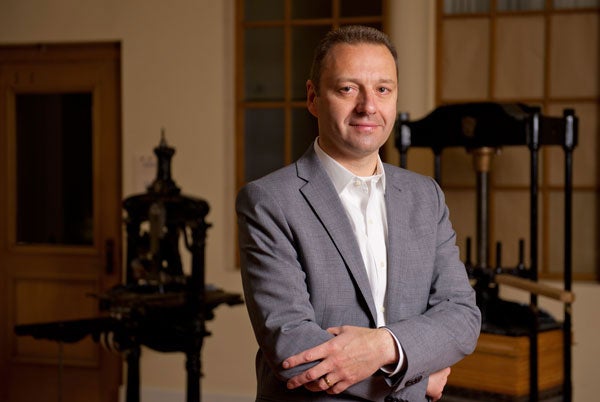|
December 19, 2012
Authors sharing their royalties make a big difference for first-time authors at Stanford University Press
In the world of academic publishing, young scholars can represent an economic risk. Stanford University Press has found a small way to help them. By Cynthia Haven

Alan Harvey, director of the Stanford University Press, says about 50 authors have already directed their royalties to the new Authors Fund. (Linda A. Cicero / Stanford News Service)
It's Christmas. On street corners, seasonal Santas ask for small change and hardscrabble charities ask for contributions to their penny jars – because every little bit makes a difference.
The same is true for university presses. Everyone knows it's a hard time in the publishing industry, but among the hardest hit have been young, unpublished scholars looking to make their mark in the world.
"It's easy to get published when you're a senior scholar with a track record. When you don't have tenure, it's harder for you to persuade a publisher to take you on," said Alan Harvey, the director of the Stanford University Press.
This fall, Stanford Press developed its own solution with an Authors Fund. How it works: authors published by the Stanford Press – whether they are employed at Stanford or elsewhere in the academic world – donate some or all of the royalties from their books to help cover the publishing costs of books written by their junior colleagues.
Although the program is only a few months old, about 50 authors have already assigned all their royalties to the fund. Harvey said the first offer came within minutes of the initial email.
Never was it more needed. The plight for young authors is worsening: "It's getting more and more difficult because, while publishing first-time authors is part of our core mission, we're expected to operate as a business, so we've got to look very carefully at any project with a high level of financial uncertainty," said Harvey.
"Traditional sales channels are slowly closing up – for example, libraries don't automatically buy these books anymore. Yet publishing books is still part of the requirement for tenure and promotion. We're caught somewhere in the middle: we are committed to the part we play in the tenure and promotion process – but at the same time we have to live sustainably."
The Press has had a long history of supporting first-time authors; about 10-15 percent of its lists are first-time authors. "It's higher, definitely higher, than most university presses," Harvey said. This labor has borne high-quality fruit: The list of first-time authors published by Stanford Press includes a number of senior members of the Stanford community, such as historians Gordon Chang, Paul Seaver and Steve Zipperstein.
Donations to the Authors Fund may be small – the equivalent of a scholarly penny jar. As published books move into the "long tail" of sales, royalties dwindle and can become more of an administrative burden for authors than a revenue source. The Authors Fund offers authors the option of saving on paperwork while at the same time benefiting the scholarly community.
"The total to date is modest, but it is slowly increasing," Harvey said. "The point is, it really does make a difference." For example, even one or two thousand dollars can have an impact on whether a book is published in hardcover or paperback, on the size of the print run or on the list price.
Moreover, donated royalties continue into the future. "If it supports two books this year, it could well support two books next year – maybe even four books" said Harvey.
"If everyone who made $50 or less (per year) donated their royalties, we'd wind up getting enough to make a real difference."
Harvey said he would "hesitate to call the Authors Fund entirely unique, given the wide range of fundraising activities among university presses." But using donated royalties as a penny jar to underwrite new authors is definitely a unique twist for a 21st-century problem.
Cynthia Haven is the associate director of communications for Stanford University Libraries.
-30-
|